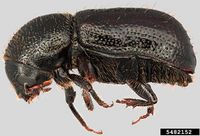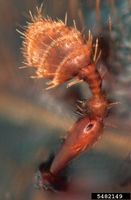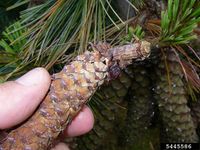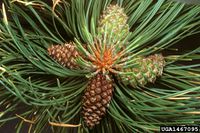Difference between revisions of "Conophthorus ponderosae"
| Line 1: | Line 1: | ||
| − | {{ | + | {{TaxLinks|LnkConophthorus}} |
| − | {{LiteratureDB|{{PAGENAME}}|browse}} | + | {{LiteratureDB|{{PAGENAME}}|browse,crops}} |
[[File:Conophthorus_ponderosae_IPM5477289.jpg|250px|thumb|''Conophthorus ponderosae'' (click on image to enlarge it)<br/>Author(s): Javier Mercado, Colorado state University<br/>Source: [http://www.ipmimages.org/browse/detail.cfm?imgnum=5477289 IPM Images]]] | [[File:Conophthorus_ponderosae_IPM5477289.jpg|250px|thumb|''Conophthorus ponderosae'' (click on image to enlarge it)<br/>Author(s): Javier Mercado, Colorado state University<br/>Source: [http://www.ipmimages.org/browse/detail.cfm?imgnum=5477289 IPM Images]]] | ||
| − | <font color="#800000">'''''Conophthorus ponderosae'''''</font> | + | <font color="#800000">'''''Conophthorus ponderosae'''''</font> Hopkins, 1915 - (ponderosa pine cone beetle) |
| − | + | ||
| − | ''' | + | This cone beetle is found in western North America from Canada to Mexico. It attacks the cones of several pine species, mainly western white pine, ''Pinus monticola'', and ponderosa pine, ''P. ponderosae''. It can be a pest of these pines by destroying up to 90% of the developing cones. For management, raking the infected cones together and burning them is recommended. |
| − | + | ||
| − | + | ||
| + | Attacks start at the base of cones, with the females tunnelling through the cones and laying eggs inside. The larvae feed on the cones and the seeds and infested cones stop development, wither and either remain attached to the tree or fall to the ground. Larval development is completed during the summer and after pupation, the adults remain in the cones and emerge the coming spring. Adults are dark brown to black and about 3 mm long. | ||
{{VN | {{VN | ||
|en=ponderosa pine cone beetle<br/>lodgepole cone beetle | |en=ponderosa pine cone beetle<br/>lodgepole cone beetle | ||
|fr=scolyte des cônes du pin | |fr=scolyte des cônes du pin | ||
}} | }} | ||
| + | '''Synonyms:'''<br/> | ||
| + | ''Conophthorus monticolae''<br/> | ||
| + | ''Conophthorus contortae'' | ||
| + | |||
<gallery widths=200px caption="Other images of Conophthorus ponderosae (IPM Images - click to enlarge)"> | <gallery widths=200px caption="Other images of Conophthorus ponderosae (IPM Images - click to enlarge)"> | ||
Latest revision as of 13:15, 15 February 2018
| Literature database |
|---|
| 4 articles sorted by: |
| • year (recent ones first) |
| • research topics |
| • countries/regions |
| • host plants |
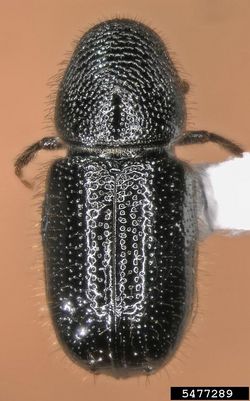
Author(s): Javier Mercado, Colorado state University
Source: IPM Images
Conophthorus ponderosae Hopkins, 1915 - (ponderosa pine cone beetle)
This cone beetle is found in western North America from Canada to Mexico. It attacks the cones of several pine species, mainly western white pine, Pinus monticola, and ponderosa pine, P. ponderosae. It can be a pest of these pines by destroying up to 90% of the developing cones. For management, raking the infected cones together and burning them is recommended.
Attacks start at the base of cones, with the females tunnelling through the cones and laying eggs inside. The larvae feed on the cones and the seeds and infested cones stop development, wither and either remain attached to the tree or fall to the ground. Larval development is completed during the summer and after pupation, the adults remain in the cones and emerge the coming spring. Adults are dark brown to black and about 3 mm long.
| Vernacular names | |
|---|---|
| • English: | ponderosa pine cone beetle lodgepole cone beetle |
| • Français: | scolyte des cônes du pin |
Synonyms:
Conophthorus monticolae
Conophthorus contortae
- Other images of Conophthorus ponderosae (IPM Images - click to enlarge)
